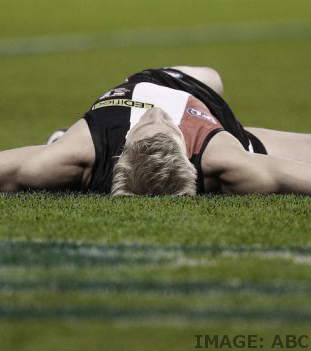Footy study looks at head effects
 The AFL has put up money for the first comprehensive study on the brains of retired football players.
The AFL has put up money for the first comprehensive study on the brains of retired football players.
Research will focus on former footballers who have suffered repeated knocks to the head.
The study, which is spearheaded by the AFL Players Association (AFLPA), follows the early retirement of several players in recent years due to concussion.
The University of Melbourne has been brought in to survey 40 young and old former players who have suffered concussions.
Their experiences will be measured against 20 field umpires, who have not suffered concussion.
It is a sign of a shift in thinking about concussion by the AFL, which has recently introduced a series of concussion protocols for players.
“These sports generate a lot of money so the participants, the athletes, the stars, the people who put their bodies on the line week in week out, need to be looked after later in life,” AFLPA president Ian Prendergast told ABC reporters.
North Melbourne forward Leigh Adams, Geelong's Sam Blease and Brisbane Lions defender Matt McGuire have all retired on the advice of doctors after concussions this year.
University of Melbourne neurophysiologist Dr Alan Pearce will run the research, and says the first stage will see players undergo ‘transcranial magnetic stimulation’.
It measures the ways that muscle respond to the brain.
Dr Pearce was behind a 2013 study that showed retired players (now in their fifties) had abnormal reactions to the electrical stimulus, similar to the responses stroke patients.
He has also conducted research that found a link between these abnormal reactions and “loss of attention and memory span problems”.
“The consistency of the brain is like custard,” Dr Pearce told the ABC.
“When you get a knock to the head, the brain will move inside the head because it's in a fluid.
“I guess the analogy is being in a car accident and you keep moving forward and backwards.
“With the brain being knocked time and time again, the movement and the tearing and the shearing leads to nerve cell death and that continual process, as you start to lose more and more neurons, will start to affect mental cognitive issues.”
The study comes at an important time for the administrative bodies of contact sports.
In the US, the NFL is in the midst of a legal battle with retired players who allege concussions suffered in the sport have left them with permanent brain injuries.
That case was inspired by research at the Boston University into chronic traumatic encephalopathy (CTE).
“It's a neurodegenerative condition. It was once called punch-drunk syndrome colloquially and it was really focused on boxers, so the slurring and looking like they're really drunk,” Dr Pearce explains.
The Boston researchers said studies show the condition is not limited to boxers, with analysis of the brains of deceased NFL players findings signs of CTE also.
But the Boston research remains controversial, and even the AFL’s own concussion panel (which includes eminent neurosurgeons) saying it is sceptical.
The AFL reportedly believes the research is selective, incomplete, and has findings that are yet to be reflected in subsequent studies.
Dr Pearce's will not be looking for CTE itself, as it currently can only be found post-mortem.
“One of the things about CTE is that we've got to be very careful about applying this to everyone,” Dr Pearce said.
“There are only a very small number of cases of CTE in the wider picture, so we've got a lot more research to understand about it and also having verification of the disease around the world rather than in just one or two places only.”
He said he hopes to get a better picture of what happens to players' brains after repeated concussions, but at the moment the jury is “still out in terms of the impact that concussions cause”.
“There are other factors which may contribute to players suffering behavioural issues later in life,” he said.
“But I think there's general acceptance that there is a very real risk that if you suffer a number of concussions, you could end up with permanent damage.”








 Print
Print